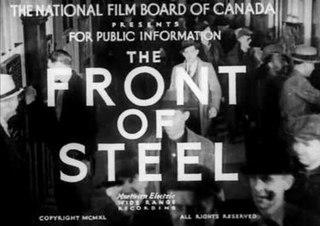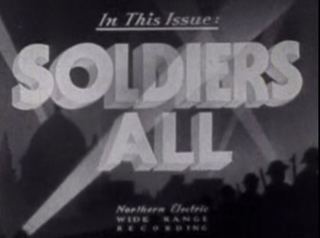Jane Marsh Beveridge was a Canadian director, producer, editor, composer, screenwriter, teacher and sculptor. She was best known as one of the pioneering filmmakers at the National Film Board of Canada (NFB).

The Battle of Brains is a 13-minute 1941 Canadian documentary film, made by the National Film Board of Canada (NFB) as part of the wartime Canada Carries On series. The film, directed by Stanley Hawes and produced by Stuart Legg, contrasted modern warfare with the First World War. The film's French version title is Sur le front scientifique.

U.N.R.R.A. presents In the Wake of the Armies ... is a 13-minute 1944 Canadian documentary film, made by the National Film Board of Canada (NFB) for the United Nations Relief and Rehabilitation Administration (UNRRA), as part of the wartime Canada Carries On series. The film, directed and edited by Guy Glover, described the work of the UNRRA during the Second World War and Canada's role in the relief agency. The film's French version title is À la suite de nos armées viendra l'entraide.

Proudly She Marches is an 18-minute 1943 Canadian documentary film, made by the National Film Board of Canada (NFB) as part of the wartime Canada Carries On series. The film, directed by Jane Marsh and produced by Raymond Spottiswoode, described the work of Canadian women in uniform during the Second World War. The film's French version is titled Carrières de femmes.

Inside Fighting Canada is an 11-minute 1942 Canadian documentary film, made by the National Film Board of Canada (NFB) as part of the wartime Canada Carries On series. The film, written and directed by Jane Marsh and produced by James Beveridge, was an account of the Canadian military during the Second World War. The film's French version is titled Canada en guerre.

The Front of Steel is an 11-minute 1940 Canadian documentary film, made by the National Film Board of Canada (NFB) as part of the wartime Canada Carries On series. The film, directed by John McDougall and produced by Stuart Legg, is an account of the value of steel in war production in Canada during the Second World War.

Letter from Aldershot is a nine-minute 1940 Canadian documentary film, made by the National Film Board of Canada (NFB) as part of the wartime Canada Carries On series. The film was directed by John Taylor and produced by Stuart Legg.

Heroes of the Atlantic is a 1941 15-minute Canadian short documentary film, part of the Canada Carries On series of wartime films by the National Film Board of Canada (NFB), produced for the Office of Public Information. The film documented the work of the Royal Canadian Navy and the Merchant Marine during the Battle of the Atlantic in the Second World War. Heroes of the Atlantic was directed by J.D. Davidson and produced by Stanley Hawes.

Letter from Camp Borden is a 17-minute 1941 Canadian documentary film, made by the National Film Board of Canada (NFB) as part of the wartime Canada Carries On series. The film was directed by Raymond Spottiswoode and produced by Stuart Legg. Letter from Camp Borden chronicles the experiences in 1941 of a number of soldiers training at the Canadian Army's Camp Borden during wartime.

Soldiers All is a 20-minute 1941 Canadian documentary film, made by the National Film Board of Canada as part of the wartime Canada Carries On series. The film was directed and produced by Stuart Legg. Soldiers All describes the experiences in 1941 of soldiers, airmen and sailors in Great Britain and Canada during wartime. The film's French version title is Frères d'armes.

The Gates of Italy is a 21-minute 1943 Canadian documentary film, made by the National Film Board of Canada as part of both the wartime Canada Carries On and The World in Action series. The film was written, directed and produced by Stuart Legg and Tom Daly. The Gates of Italy describes the last days of Benito Mussolini's rule over Italy in 1943 during the Second World War.

Squadron 992 is a 23-minute 1940 British propaganda film produced by the General Post Office GPO Film Unit of the British Ministry of Information and re-distributed by the National Film Board of Canada (NFB) as part of their wartime Canada Carries On series. The film was directed by Harry Watt and produced by Alberto Cavalcanti. Squadron 992 describes the training and operations in 1940 of No. 992 Squadron RAF, a Royal Air Force (RAF) barrage balloon unit stationed in the United Kingdom. The film's French version title was Escadrille 992.

The Children from Overseas is a 10-minute 1940 Canadian documentary film, made by the National Film Board of Canada (NFB) as part of its Canada Carries On series.

The War for Men's Minds is a 21-minute 1943 Canadian documentary film, made by the National Film Board of Canada (NFB) as part of the wartime The World in Action series. The film was produced by Stuart Legg. The film describes the impact of propaganda from the Axis powers in 1943, during the Second World War. The French version title is À la conquête de l'esprit humain.

Letter from Overseas is a 15-minute 1943 Canadian documentary film, made by the National Film Board of Canada (NFB) as part of the wartime The World in Action series. The film describes the training and operational use of Canadian Army soldiers in 1943 during the Second World War.

Food - Weapon of Conquest is a 22-minute 1941 Canadian documentary film, made by the National Film Board of Canada (NFB) as part of the wartime Canada Carries On series. The film was written, directed and produced by Stuart Legg. Food - Weapon of Conquest shows the food shortage in Nazi-occupied countries in the Second World War, contrasted with the Allied response to the global food crisis. The film's French version title is Une armée marche sur son estomac.

Bombing the Nazis is a 10-minute 1943 Canadian documentary film, made by the National Film Board of Canada (NFB) as part of the World War II newsreels shown at theatres in Canada and abroad. The film describes the Allied air war over Europe during the Second World War, concentrating on attacks in 1942 and 1943 on an automobile factory in Vichy France.

Tomorrow's World is a 20-minute 1943 Canadian documentary film, made by the National Film Board of Canada (NFB) as part of the wartime Canada Carries On series. The film, produced by Raymond Spottiswoode, described the importance of conservation and rationing during the Second World War, and how the world would be more prosperous and better planned because of the war efforts. The French version of Tomorrow's World is titled Le Monde de demain.

Air Cadets is a 15-minute 1944 Canadian documentary film, made by the National Film Board of Canada (NFB) as part of the wartime Canada Carries On series. The film describes the Air Cadet Movement in 1944 during the Second World War. Air Cadets was directed by Jane Marsh, who was also the writer and editor on the production. The film's French version title is Les Cadets de l'air.

The Battle of the Harvests is an 18-minute 1942 Canadian documentary film, made by the National Film Board of Canada (NFB) as part of the wartime Canada Carries On series. The film was produced by James Beveridge and directed by Stanley Jackson, who also provided the narration. The Battle of the Harvests shows how the farmers were mobilized worldwide in a battle on the farmland to serve the fighting nations during the Second World War. The film's French version title was La Bataille des récoltes.



















